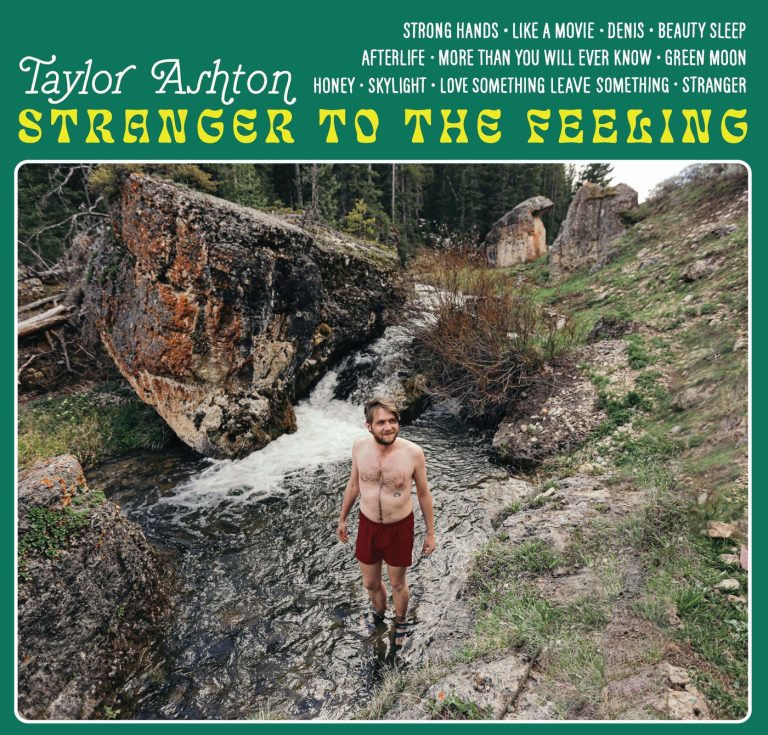Stranger to the Feeling is a roadmap. It’s a document of distance, time, and location, but most importantly – and at its heart – it’s a record of friendship. Travelling coast to coast across the American mainland, Taylor Ashton and producer Jacob Blumberg made a loose plan on where to go and when, so as to let spontaneity and happenstance dictate what would come out of the recordings they made upon the way. The album’s 11 tracks are low stakes affairs that gather friends new and old around a microphone, capturing a lightly convivial atmosphere.
These are largely acoustic affairs, Ashton playing guitar and banjo as guests harmonise alongside him and add some instrumental flourishes. Guests include Buck Meek, Benjamin Lazar Davis, Nora Fox, Courtney Hartman, and even Ashton’s wife Rachael Price on opening track “Strong Hands”. Without them and all the others, the album would be sweet, but veering on maudlin; the additional touches of woodwinds, strings, backing vocals, and even some electronic colouring helps Stranger to the Feeling distinguish itself from a pile of other indie folk releases.
At its best the album manages to retain intimacy, even when there are other musicians in the mix. “Afterlife” has echoes of 60s acoustic folk as David Moss and Michaela Mann shadow Ashton’s voice while “Like A Movie” has a fuller palette than most other tracks – lightly inductic electric guitar from Theo Katzman, breezy drums from Louis Cato, and subtle wurlitzer from Jacob Blumberg – but it still manages to feel like the ache of one man’s heart. You can hear the hum of the room in tracks like “Skylight” and “Denis”, or the soft chirps of birds and the breeze on “More Than You Will Ever Know” (recorded at guest vocalist Judy Butterfield’s House in Santa Fe). Using both analogue and digital recording methods, Blumberg manages to weave the inside and outside world seamlessly without making it feel like you’re anywhere other than beside him and Ashton’s side.
While communality and warmth are what Stranger to the Feeling exudes best, where its let down is Ashton’s words. He can wring out wry and dark humour like he does on “Beauty Sleep” (“Everybody dies / Yeah, but I don’t wanna be so tired while I’m alive”) but elsewhere he falls into cumbersome analogies and saccharine phrasing more than he should – especially with such seasoned musicians around him. “Every inch closer you get, you feel further away,” he opens with on “Denis”, while “More Than You Will Ever Know” offers up some pure Hallmark sentimentality with “I always have, with all I’ve got / I always will, I can never not.”
The album takes a tumble in the last run of songs: “Skylight” is a light-hearted tale of literally falling for someone, but it quickly loses its charm and humour after a few listens; “Love Something Leave Something” boasts some welcome electronic edges to Ashton’s banjo playing but it’s chorus is trite and bland; and closing track “Stranger” has Ashton taking us through the multiple dictionary entries for the titular word before ending on the eye-rolling non-epiphany of “To me there is nothing stranger / than being in love with a stranger.”
Sometimes Ashton’s schtick works well though: on “Honey” he doubles down on taking the titular word in both its literal and affectionate sense, but the chorus is sultry smooth and repeatedly enjoyable despite it oozing little seediness. The flute and clarinet on “Strong Hands” adds an airy sweetness, making for a charming ode to the love of Ashton’s life while aforementioned “Like A Movie”’s chorus builds with each turn, painting a picture line by line and echoing early Bon Iver tracks. Elsewhere, while the intimacy and sociable atmosphere lingers charmingly, Ashton doesn’t always make music that felt like the 4,000 mile road trip was entirely necessary. Stranger to the Feeling may be a road map, but it might have been better as a few postcards instead.

